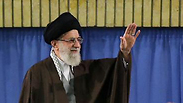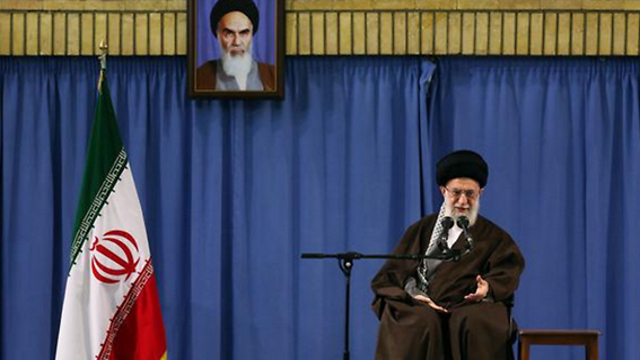
Iran's Supreme Leader
Ayatollah Khamenei rejects observer access to military sites
As negotiatiors resume talks, supreme leader of Islamic republic vows to resist American 'coercion' by declining access to facilities, scientists.
Iran's supreme leader vowed Wednesday he will not allow international inspection of Iran's military sites or access to Iranian scientists under any nuclear agreement with world powers, as negotiators from all parties met in Vienna.
Ayatollah Ali Khamenei told military commanders Wednesday that Iran will resist "coercion and excessive demands" from America and other world powers. The comments, reported on state TV, were the latest in a series of forthright statements on inspections in the countdown to a June 30 deadline to resolve a decade-old standoff over Iran's nuclear work.
Negotiators from Iran and a six nation group – the US, Russia, China, Britain, France and Germany – have launched a new round of talks in Vienna focused on reaching a final deal that curbs Iran's nuclear program in return for lifting economic sanctions. The two sides reached a framework agreement in March and hope to strike a final deal by June 30.
A fact sheet on the framework accord issued by the US State Department said Iran would be required to grant the UN nuclear agency access to any "suspicious sites."
Iran reached a tentative deal with the powers on April 2 to allow UN inspectors to carry out more intrusive, short-notice inspections under an "Additional Protocol" to the Non-Proliferation Treaty. But there have been sharply differing interpretations from both sides on the details of that access.
But Khamenei indicated that the Americans are increasing their demands that international inspection of Iran's military sites and interviews with Iranian scientists be included in the final deal.
"The impudent and brazen enemy expects that we allow them talk to our scientists and researchers about a fundamental local achievement but no such permission will be allowed," Khamenei told military commanders in Tehran Wednesday, in remarks broadcast on state TV.
Khamenei said interviewing Iranian nuclear scientists would be an affront to Iran's dignity. "No inspection of any military site or interview with nuclear scientists will be allowed."
"I will not allow foreigners to interview – which is tantamount to interrogation – the prominent beloved scientists and sons of this nation," he said.
Ali Akbar Velayati, a senior adviser to Khamenei, was quoted by Iranian media this week as accusing the Americans of changing their position and toughening their stance as the deadline approaches.
"They insist on crossing (our) red lines. This turns into an obstacle," Velayati was quoted as saying.
Diplomats said ahead of Wednesday's meeting that progress is being made but significant gaps remain on a main document and technical annexes ahead of an end-of-June deadline.
Iran's team is led by Deputy Foreign Minister Abbas Araghchi. EU official Helga Schmidt is heading the other side. Senior officials from the US, Russia, China, Britain, France and Germany may join in later.
The deal aims for strict limits on Iranian nuclear capabilities that could be used to make weapons. Tehran denies any interest in such arms but is negotiating for a lifting of sanctions.
The diplomats demanded anonymity because they are not authorized to discuss the talks.
Reuters and the Associated Press contributed to this report.











